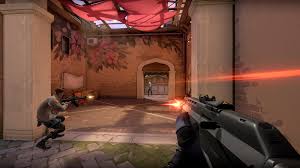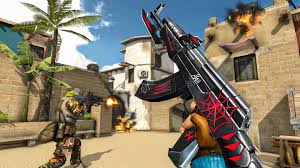FPS Strategy Guide for Online Competitive Gaming Mastery 2025
FPS Strategy FPS StrategyIntroduction to FPS Strategy
First-Person Shooter (FPS) games dominate the online gaming world because they demand not only fast reflexes but also strategic thinking. An effective FPS Strategy is the key to excelling in matches, whether you play casually or competitively. The right approach can drastically improve your chances of victory.

Players often underestimate how much planning influences performance. Shooting accuracy is vital, but understanding maps, positioning, and resource management are just as important. This is why FPS deserves careful study and application.
In this article, we will explore different aspects of FPSStrategy in depth. From basic mechanics to advanced techniques, you’ll gain insights into how to outplay opponents in a wide variety of gaming scenarios.
The Core Principles of FPS Strategy
Every FPSStrategy starts with understanding the fundamentals. Movement, aiming, and awareness are the foundation for consistent performance. Without mastering these, advanced tactics become less effective.
A good FPSStrategy incorporates reaction speed but also decision-making under pressure. Knowing when to push, when to retreat, and how to control choke points can make the difference between victory and defeat.
Another principle is adaptability. Online opponents vary in skill, playstyle, and unpredictability. A rigid approach often fails, but a flexible FPSStrategy especially in PausSlot ensures you can adjust in real-time to changing conditions.
Map Awareness as the Heart of FPS Strategy
Map awareness is a critical component of FPSStrategy. Each map in an FPS game has unique pathways, choke points, and areas that favor either attackers or defenders. Mastering these layouts gives you a tactical advantage.

Players should learn common player routes, spawn locations, and power-up spots. This knowledge allows you to anticipate enemy movement and plan ambushes effectively.
Good FPSStrategy requires constant observation. Watching radar, sound cues, and teammate positioning helps maintain a mental map of enemy presence. Awareness leads to faster reactions and smarter plays.
Weapon Mastery and FPS Strategy
No FPSStrategy is complete without proper weapon mastery. Every weapon class—rifles, shotguns, snipers, and pistols—serves a different purpose in combat. Learning their strengths and weaknesses is essential.
For example, rifles are versatile and effective at medium range, while shotguns dominate in close quarters. Snipers control long sightlines but require precision and timing. Selecting the right weapon for the right scenario is a cornerstone of FPSStrategy.
Practicing recoil control, burst firing, and aiming down sights improves weapon efficiency. Combining these technical skills with situational awareness maximizes your chances of winning duels.
Team Communication as an FPS Strategy Advantage
In team-based FPS games, communication defines success. Even the best individual players struggle without coordinated teamwork. Clear callouts and strategic planning amplify collective strength.
Effective communication involves more than shouting enemy locations. It also includes sharing resource updates, coordinating attacks, and warning of flanking maneuvers. This transforms a group of individuals into a synchronized unit.
A solid FPSStrategy leverages tools like voice chat, pings, and signals. Teams that talk effectively win more often because they make smarter, faster decisions during critical moments.
Positioning and Cover in FPS Strategy
Positioning plays a massive role in FPSStrategy. Standing in open areas makes you an easy target, while using cover allows you to survive longer and retaliate effectively.
Smart players analyze the battlefield for strong positions that provide vision and safety. High ground, narrow corridors, and concealed corners all offer tactical opportunities.
Cover is also about timing. Peeking at the right moment, baiting enemies, and retreating when necessary all contribute to superior positioning and survival.
Movement Tactics in FPS Strategy
Movement is more than running from one point to another. A good FPSStrategy considers how to move unpredictably while minimizing vulnerability. Strafing, crouching, and jump techniques are common in competitive play.
Fast movement can catch enemies off guard, but reckless sprinting often leads to ambushes. Strategic movement ensures you control pacing and reduce exposure.
Advanced movement mechanics, such as slide-canceling or bunny hopping, vary by game but add another layer of depth to FPS Strategy. These techniques help you stay evasive while keeping accuracy intact.
Economy Management in FPS Strategy
Some FPS titles incorporate an economy system, where players buy weapons, armor, or abilities. Managing resources wisely is a crucial FPSStrategy element in these games.
Buying the best gun every round may feel powerful, but poor resource management often leads to unprepared late-game scenarios. Successful teams coordinate purchases to maximize efficiency.
A balanced FPSStrategy uses eco-rounds, where players save resources, and full-buy rounds, where everyone gears up. This ensures sustained competitiveness throughout the match.
The Psychological Side of FPS Strategy
FPSStrategy is not only about mechanics but also psychology. Intimidating opponents, controlling tempo, and predicting enemy behavior are powerful mental tactics.
Confidence often influences gameplay. A player who maintains composure under pressure can outthink aggressive or reckless enemies. Psychological strength becomes a hidden advantage in prolonged battles.

Baiting, fake attacks, and misdirection are also part of the psychological FPSStrategy. By manipulating how opponents perceive the situation, you can force them into mistakes.
FPS Strategy for Competitive Tournaments
In competitive tournaments, FPSStrategy becomes even more crucial. Teams face highly skilled opponents who have studied maps, meta strategies, and player tendencies.
Preparation involves reviewing past games, analyzing team roles, and setting specific playstyles. Scrims and practice sessions refine strategies for tournament execution.
FPSStrategy in this context requires adaptability. Even the most rehearsed tactics can fail if opponents counter effectively, so improvisation becomes vital.
FPS Strategy in Solo Play
Solo players often lack the advantage of coordinated teammates. However, FPSStrategy still ensures success in individual performance. Solo play requires higher awareness and self-reliance.
Using stealth, avoiding unnecessary fights, and picking favorable engagements become essential tactics. Solo FPSStrategy emphasizes survival while maximizing kill opportunities.
Maintaining patience and discipline prevents overextending. A skilled solo player can carry games simply by applying calculated strategies consistently.
Advanced Training for FPS Strategy
Improvement requires structured practice. A strong FPSStrategy includes time spent in aim trainers, custom lobbies, and strategy drills.
Training reflexes, reaction time, and muscle memory ensures peak performance during matches. Regular practice builds consistency and confidence.
Equally important is reviewing gameplay. Watching replays allows players to identify mistakes, learn from losses, and refine their FPSStrategy.
Technology and Tools Supporting FPS Strategy
Modern technology enhances FPSStrategy. High-refresh-rate monitors, gaming mice, and optimized settings improve responsiveness and accuracy.
Software tools like aim trainers, stat trackers, and tactical overlays also support performance. By analyzing data, players can refine habits and target weaknesses.
These technological aids may not replace skill, but they elevate execution of FPSStrategy to a professional level.
Mastering Patience in FPS Strategy
Patience is one of the most underestimated elements of FPSStrategy. Waiting for the right moment to engage can often deliver better results than rushing recklessly.
A patient player observes the environment, studies enemy movement, and attacks when the advantage is clear. This approach often catches aggressive opponents by surprise.
In long matches, patience prevents unnecessary deaths and helps maintain focus. Consistency and discipline are as powerful as raw reflexes in FPSStrategy.
Reading Opponent Behavior in FPS Strategy
A vital psychological tactic in FPSStrategy is reading opponents. Observing patterns, movements, and playstyles provides clues about future actions.
Some players repeat the same routes or firing positions. Once identified, these habits can be exploited for easy eliminations.
Predicting behavior allows players to stay one step ahead, creating the feeling of “mind games” that defines high-level FPSStrategy.
Controlling the Match Tempo with FPS Strategy
Controlling tempo means dictating how fast or slow the game unfolds. In FPSStrategy, this forces opponents to react to your pace rather than setting their own.
Aggressive pushes can overwhelm unprepared teams, while slow, methodical play can frustrate and exhaust opponents.
A team or player who controls tempo maintains the mental upper hand. This ability is often the deciding factor in close competitive matches.
The Role of Confidence in FPS Strategy
Confidence directly affects decision-making in FPSStrategy. Hesitant players often miss opportunities or retreat too quickly.
Confident players commit to their strategies and trust their instincts. This mindset intimidates enemies, who sense decisiveness in movement and actions.
True confidence comes from practice and experience, allowing players to maintain composure even when situations look unfavorable.
Using Fear as an FPS Strategy Weapon
Fear can be a tool in FPSStrategy. By applying constant pressure, players create psychological stress that forces mistakes.
High aggression, surprise attacks, and dominating control points cause panic in less disciplined opponents. This reduces their accuracy and coordination.
A fearful opponent is predictable and reactive, giving skilled players or teams an ongoing advantage.
FPS Strategy Through Fake Retreats
One clever psychological tactic in FPSStrategy is faking retreats. Pretending to withdraw baits enemies into overextending.
When opponents chase, they often enter unfavorable positions. This creates opportunities for ambushes and easy eliminations.
Executing fake retreats requires timing and teamwork, making it one of the more advanced psychological maneuvers in FPSStrategy.
Psychological Impact of Sound in FPS Strategy
Sound plays a significant role in FPSStrategy. Footsteps, gunfire, and reload noises all provide information.
Savvy players use sound to mislead opponents—for example, faking reloads or intentionally making noise to bait enemies.
Sound manipulation creates confusion and pressure, forcing opponents into poor decisions based on incomplete information.
Pressure Situations in FPS Strategy
High-pressure rounds test a player’s mental strength. In these situations, psychological resilience is just as important as skill.
A calm player under pressure can clutch rounds that seem unwinnable. Their composure gives them an edge against nervous opponents.
FPSStrategy often revolves around mastering these pressure situations, turning tension into an advantage rather than a weakness.
Bluffing as a Core of FPS Strategy
Bluffing is a subtle but effective FPSStrategy. Pretending to push an area or faking a strategy forces enemies to waste resources.
Opponents may over-rotate or abandon strong positions if they believe false information. Bluffing exploits human psychology in competitive matches.
The best players use bluffing sparingly, ensuring it remains effective and unpredictable.
Psychological Reset in FPS Strategy
Not every round goes according to plan. Mental resets are essential to recover from losses and stay focused.
Dwelling on mistakes leads to frustration and further errors. Strong FPSStrategy includes techniques to reset mentally between rounds.
Taking deep breaths, focusing on the next play, and maintaining discipline prevent tilt and loss of confidence.
FPS Strategy in One-on-One Mind Games
Dueling in FPS games often involves mental battles. Outsmarting an enemy requires not only aim but also deception.
Players use bait shots, fake peeks, and unpredictable timing to break the opponent’s rhythm. This creates windows for decisive strikes.
Winning these mind games consistently defines high-level mastery of FPSStrategy.
Psychological Endurance in Long Matches
Long matches test concentration and focus. Fatigue can lead to poor decisions and decreased accuracy.
A strong FPSStrategy accounts for mental endurance by pacing energy, staying hydrated, and keeping composure throughout the game.
Players who remain sharp in later rounds hold a clear advantage against fatigued opponents.
FPS Strategy of Building Momentum
Momentum creates confidence and dominance in matches. Winning consecutive rounds often intimidates the enemy team.
Psychological pressure builds as opponents struggle to recover, while your team grows more confident.
Maintaining momentum requires discipline, avoiding reckless overconfidence that could reverse the advantage.
Exploiting Overconfidence in FPS Strategy
Overconfident opponents make predictable mistakes. They may rush without backup, underestimate enemies, or expose themselves unnecessarily.
A clever FPSStrategy punishes this behavior with traps and counterattacks.
By recognizing overconfidence early, players turn arrogance into opportunity for victory.
Using Silence as an FPS Strategy
Silence creates unpredictability. Moving quietly and avoiding unnecessary actions forces enemies to guess your location.
Psychologically, silence generates paranoia. Opponents waste time checking corners or retreating cautiously.
In FPSStrategy, silence can be just as powerful as aggression, making it a versatile psychological tool.
FPS Strategy and Emotional Control
Emotions often decide outcomes. Anger, frustration, or fear cause impulsive mistakes.
Maintaining emotional control ensures consistent execution of FPSStrategy, even under stress.
Professional players train emotional discipline, treating each round logically rather than emotionally.
Psychological Traps in FPS Strategy
Traps are tactics designed to exploit human tendencies. For example, leaving visible bait items or pretending to be vulnerable.
Opponents fall into these traps due to greed or curiosity, making them easy targets.
FPSStrategy thrives on these subtle psychological plays, creating advantages without direct combat.
FPS Strategy of Breaking Enemy Rhythm
Every opponent has a rhythm in movement and decision-making. Breaking it disrupts their comfort zone.
Changing pace, switching strategies, or using unexpected weapons forces them to adapt poorly.
This disruption tilts enemies and gives you the upper hand in engagements.
Misdirection as a Psychological FPS Strategy
Misdirection manipulates where enemies focus their attention. Throwing decoys or making noise in one area draws them away from the true target.
Opponents split resources and weaken their defense, giving your team easier paths to objectives.
Executed properly, misdirection becomes one of the most reliable psychological FPSStrategy methods.
Intimidation Through Performance in FPS Strategy
Consistently winning duels or controlling key areas builds fear in opponents.
They begin avoiding certain routes or playing cautiously, which limits their options.
This intimidation is a powerful psychological edge that comes naturally with skillful FPSStrategy execution.
FPS Strategy and Body Language in Gameplay
Even in digital games, body language—such as movement patterns—reveals intentions.
Predictable behavior makes players easy to read, while deceptive body language hides real plans.
A clever FPSStrategy manipulates movement to mislead opponents and gain surprise advantages.
The Role of Adaptability in Psychological FPS Strategy
Rigid strategies are easy to counter once discovered. Adaptability ensures psychological dominance.
Changing tactics frequently keeps enemies guessing and prevents them from gaining confidence.
Adaptable FPSStrategy reflects true mastery, combining creativity with mental agility.
The Psychology of Comebacks in FPS Strategy
Comebacks are possible when mental resilience remains strong. Believing in recovery motivates players to fight harder.
Opponents, meanwhile, feel pressure as they lose their lead, leading to panic.
Strong FPSStrategy leverages this shift in momentum, turning underdog situations into victories.
FPS Strategy for Handling Tilt
Tilt occurs when frustration leads to poor decision-making. Recognizing tilt early prevents spirals.
Good FPSStrategy involves calming techniques, supportive teamwork, and resetting focus.
Players who avoid tilt maintain consistent performance, regardless of match outcomes.
Psychological Tricks in Timing and Delay
Timing is crucial in FPSStrategy. Delaying an action slightly can surprise enemies who expect immediate engagement.
For example, waiting an extra second before peeking throws off enemy aim.
Such psychological tricks in timing are small but highly effective in duels and team fights.
FPS Strategy with Decoy Usage
Decoys and fake utilities are designed to manipulate psychology. Opponents may waste resources reacting to illusions.
This distraction creates windows for real attacks.
Using decoys effectively is a hallmark of advanced FPSStrategy, blending technical skill with mental misdirection.
Training Mental Resilience for FPS Strategy
Mental resilience develops through consistent practice under pressure. Players learn to stay calm regardless of setbacks.
Resilient players view losses as lessons rather than failures, strengthening their overall gameplay.
This mental toughness is an inseparable component of long-term FPS Strategy success.
FPS Strategy of Creating Uncertainty
Uncertainty makes opponents second-guess every decision. By being unpredictable, you prevent them from gaining control.
Enemies who feel uncertain play more cautiously, losing initiative.
Mastering uncertainty ensures psychological dominance, giving you consistent leverage in matches.
The Impact of Focus in FPS Strategy
Focus sharpens awareness, improves reaction speed, and enhances decision-making.
A distracted player misses key cues and falls into traps.
Maintaining razor-sharp focus is a psychological discipline central to FPS Strategy at the highest level.
Psychological Preparation Before Matches
The match begins before the first round. Proper mental preparation ensures optimal performance.
Visualization, breathing exercises, and confidence-building routines create a winning mindset.
A pre-game routine is a vital part of consistent FPS Strategy execution.

